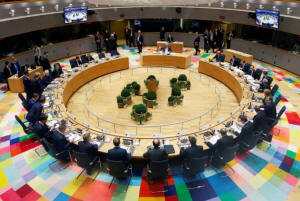|
EU leaders grope for unity as Britain
walks out
 Send a link to a friend
Send a link to a friend
 [March 10, 2017]
By Robert-Jan Bartunek and Waverly Colville [March 10, 2017]
By Robert-Jan Bartunek and Waverly Colville
BRUSSELS (Reuters) - The leaders of the
European Union tried to put a poisonous row with Poland behind them on
Friday but struggled to agree on ways to hold the bloc together
following the shock of Britain's vote to walk out.
Prime ministers and presidents of the 27 surviving members met for a
second day in Brussels, after Britain's Theresa May had left. Their goal
was to set out guidelines for officials to draft a rousing declaration
of unity and progress which they will then endorse at a ceremony in Rome
in two weeks' time.
But that event on March 25, the 60th anniversary of the signing of the
bloc's founding treaty in the Italian capital, has been overshadowed by
May preparing to launch the two-year Brexit process in the coming days
and by a furious row on Thursday with Warsaw, the major eastern power in
the EU.
Beata Szydlo found herself totally isolated in a vain attempt to block
the reappointment of Donald Tusk, her predecessor as Polish prime
minister, as the chair of EU summits. It was a relatively minor issue
but touched a raw nerve with Tusk's nemesis Jaroslaw Kaczynski, Szydlo's
party leader.

That personal enmity, fed by a heated domestic political debate in
Poland, saw the Warsaw government alienate even its closest allies like
Hungary and Slovakia. They lined up with all the rest to back Tusk and
sweep aside Szydlo's objections.
POLISH PETULANCE
The Polish refusal to compromise -- Szydlo even withheld her approval
from the entire official record of the summit, forcing officials into
awkward legal nuances -- angered many and cast a pall over Friday's
proceedings.
Luxembourg Prime Minister Xavier Bettel accused Szydlo of childish
petulance: "This is a boycott," he said. "A reaction of defiance from
the corner, not behaving like adults."
Austrian Chancellor Christian Kern said: "I see no sense in getting
offended and retreating into a corner, whether for the Poles or the rest
... The Poles have the same interest as we have, to make progress in
terms of security and the economy."
[to top of second column] |

European Union leaders attend a summit in Brussels, Belgium March
10, 2017. REUTERS/Francois Lenoir

Leaders on Friday morning were studying a series of proposals for a
Rome Declaration drafted by Tusk's staff and the Italian hosts.
Diplomats said no formal proposed draft of the March 25 text would
be produced on Friday but that officials would work on it over the
coming two weeks.
It will need to navigate competing demands; rich, western states led
by Germany and France argue that the lesson of Brexit should be that
the EU should deepen integration, at least among some countries in
certain areas such as the economy and defense, in order to shore up
flagging popular support for the Union.
Poland and others in the east, where public support for the Union is
bolstered by subsidy payments funded by the west, are loath to give
up any national sovereignty again - secured only after the Cold War
- to an EU that Warsaw's foreign minister described on Thursday as
being subject to "German diktat".
(Reporting by Alastair Macdonald; Editing by Gareth Jones)
[© 2017 Thomson Reuters. All rights
reserved.]
Copyright 2017 Reuters. All rights reserved. This material may not be published,
broadcast, rewritten or redistributed.

 |